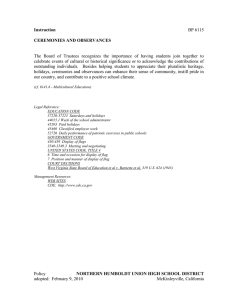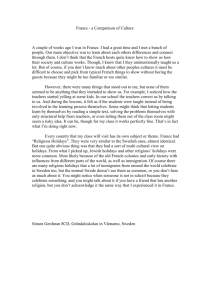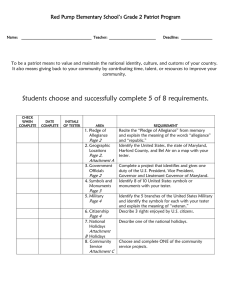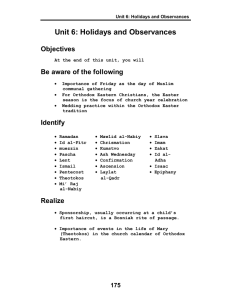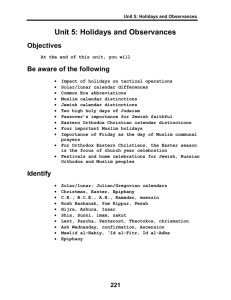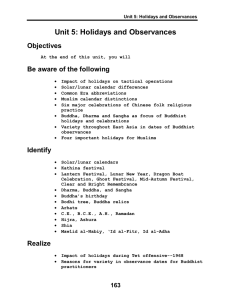6115 - Capitol Region Education Council
advertisement
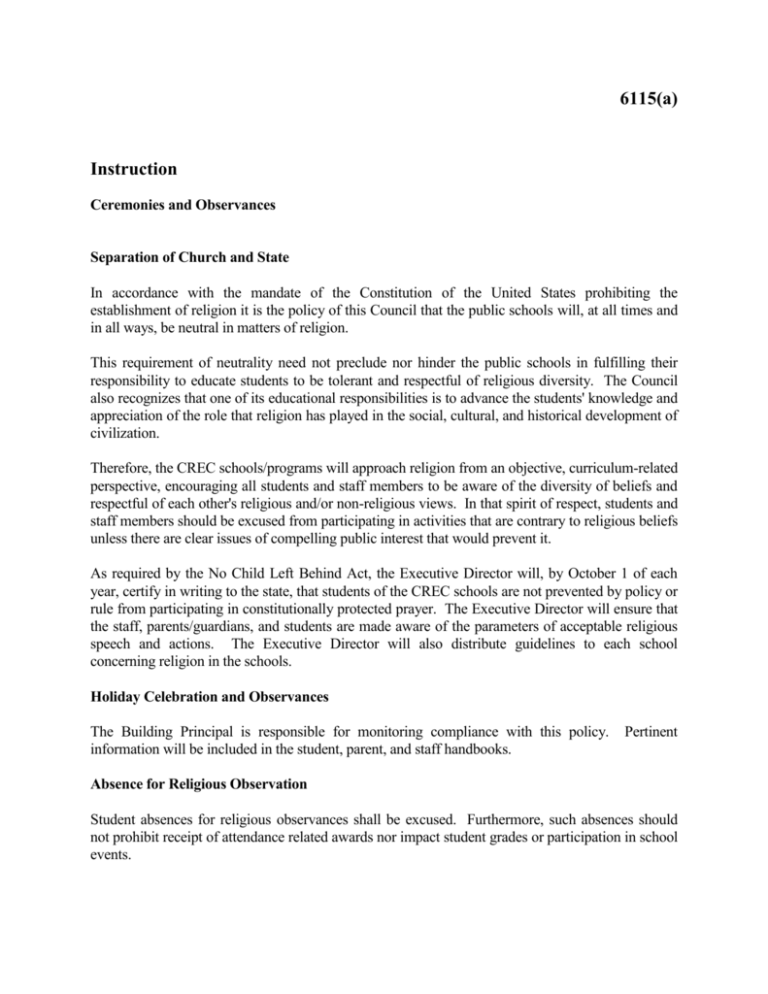
6115(a) Instruction Ceremonies and Observances Separation of Church and State In accordance with the mandate of the Constitution of the United States prohibiting the establishment of religion it is the policy of this Council that the public schools will, at all times and in all ways, be neutral in matters of religion. This requirement of neutrality need not preclude nor hinder the public schools in fulfilling their responsibility to educate students to be tolerant and respectful of religious diversity. The Council also recognizes that one of its educational responsibilities is to advance the students' knowledge and appreciation of the role that religion has played in the social, cultural, and historical development of civilization. Therefore, the CREC schools/programs will approach religion from an objective, curriculum-related perspective, encouraging all students and staff members to be aware of the diversity of beliefs and respectful of each other's religious and/or non-religious views. In that spirit of respect, students and staff members should be excused from participating in activities that are contrary to religious beliefs unless there are clear issues of compelling public interest that would prevent it. As required by the No Child Left Behind Act, the Executive Director will, by October 1 of each year, certify in writing to the state, that students of the CREC schools are not prevented by policy or rule from participating in constitutionally protected prayer. The Executive Director will ensure that the staff, parents/guardians, and students are made aware of the parameters of acceptable religious speech and actions. The Executive Director will also distribute guidelines to each school concerning religion in the schools. Holiday Celebration and Observances The Building Principal is responsible for monitoring compliance with this policy. information will be included in the student, parent, and staff handbooks. Pertinent Absence for Religious Observation Student absences for religious observances shall be excused. Furthermore, such absences should not prohibit receipt of attendance related awards nor impact student grades or participation in school events. 6115(b) Recognition of Religious Holidays The objective study of religious holidays provides a natural opportunity to promote an appreciation for and respect of diversity. Learning opportunities should extend beyond Judeo-Christian beliefs; reflecting the diversity of global cultures. Ceremonies and Observances Recognition of Religious Holidays 1. Recognition of religious holidays will not dominate the educational program and must support curricular objectives. 2. All religions must be afforded equal dignity, but none advanced nor disparaged. 3. Decorations which are part of custom, that have no direct religious meaning (Christmas tree, Menorah) may be displayed. Tree decoration should not promote religion nor require student participation. 4. Programs should focus on seasonal rather than religious themes inclusive of concerts, enrichment programs and Parent-Teacher Organization sales. 5. Performances which recognize holidays must be of an artistic nature, not religious. Religious music must not dominate any school program. Program selections should not, by their nature, exclude students from participation. 6. The cafeteria staff will consider religious dietary restrictions when planning menus (nonmeat meals, limiting pork to one menu choice). 7. Parents may exclude their children from programs involving the recognition of religious holidays or if celebration is in conflict with family beliefs. A written request for exclusion should be sent to the Principal. Silent Meditation The Council directs that the administration shall provide for students and teachers, the opportunity to observe an appropriate period of time for silent meditation each school day. 6115(c) Pledge of Allegiance Students will be offered the opportunity to recite the Pledge of Allegiance to the United States Flag at least once during each school day. Participation in reciting the Pledge of Allegiance will be voluntary. Students may refuse to participate in reciting the Pledge of Allegiance for any reason, including religious, political, philosophical, or personal reasons. If a student chooses not to participate, he/she may stand or sit in silence. Instruction Ceremonies and Observances Separation of Church and State Legal Reference: Connecticut General Studies 10-16a Silent Meditation PA 02-119, An Act Concerning Bullying Behavior in Schools and Concerning the Pledge of Allegiance No Child Left Behind Policy adopted: Revised: June 18, 2003 February 16, 2005 CAPITOL REGION EDUCATION COUNCIL Hartford, Connecticut
